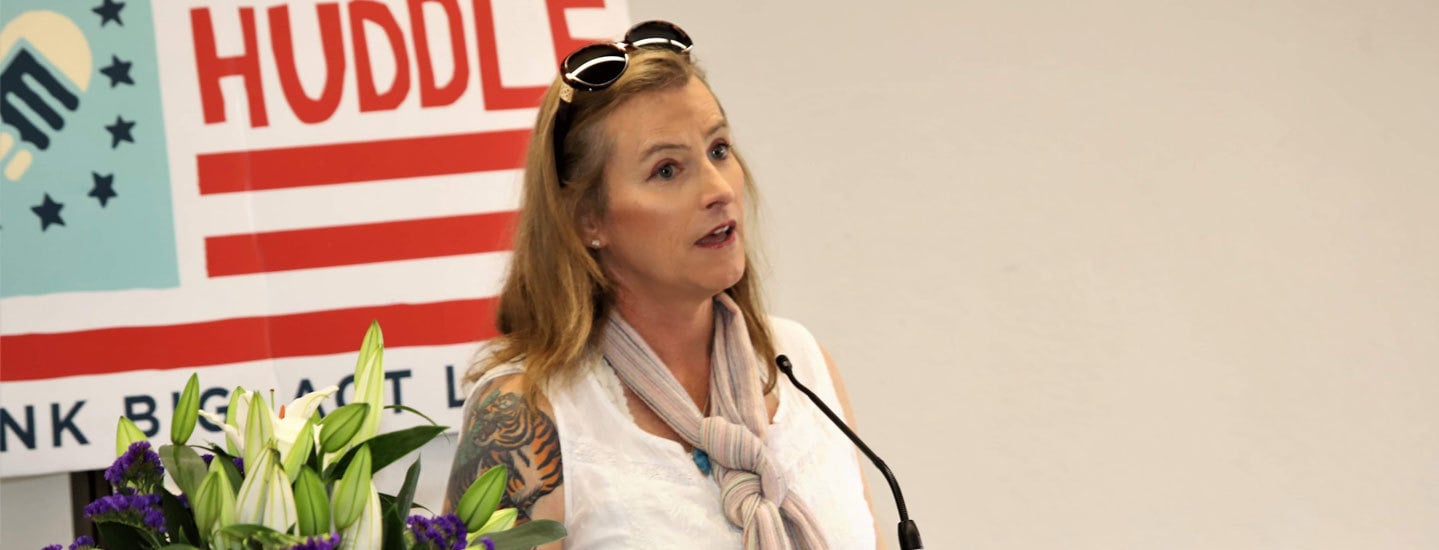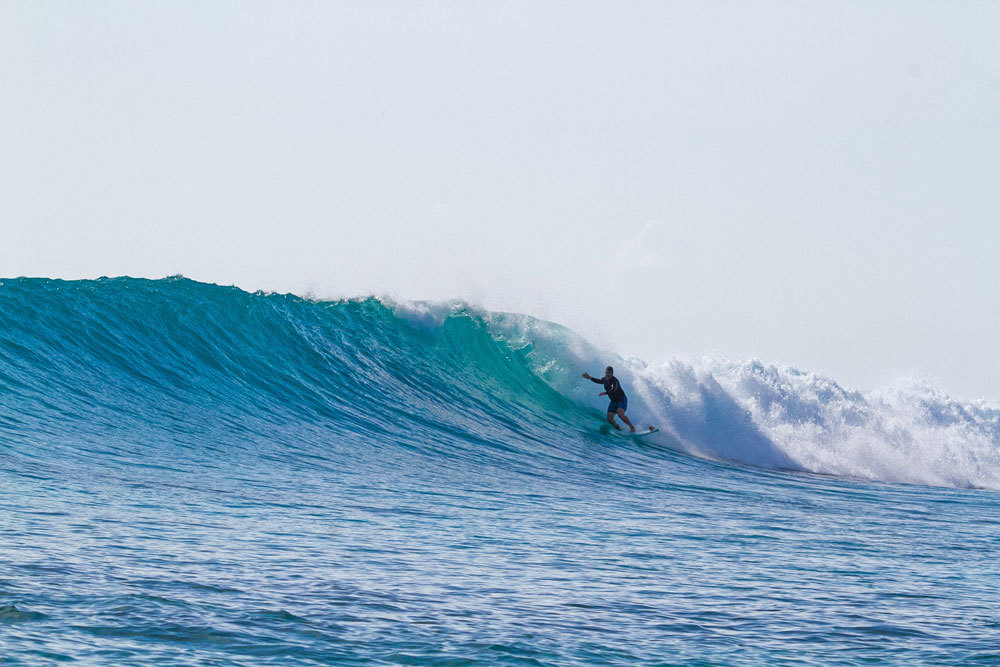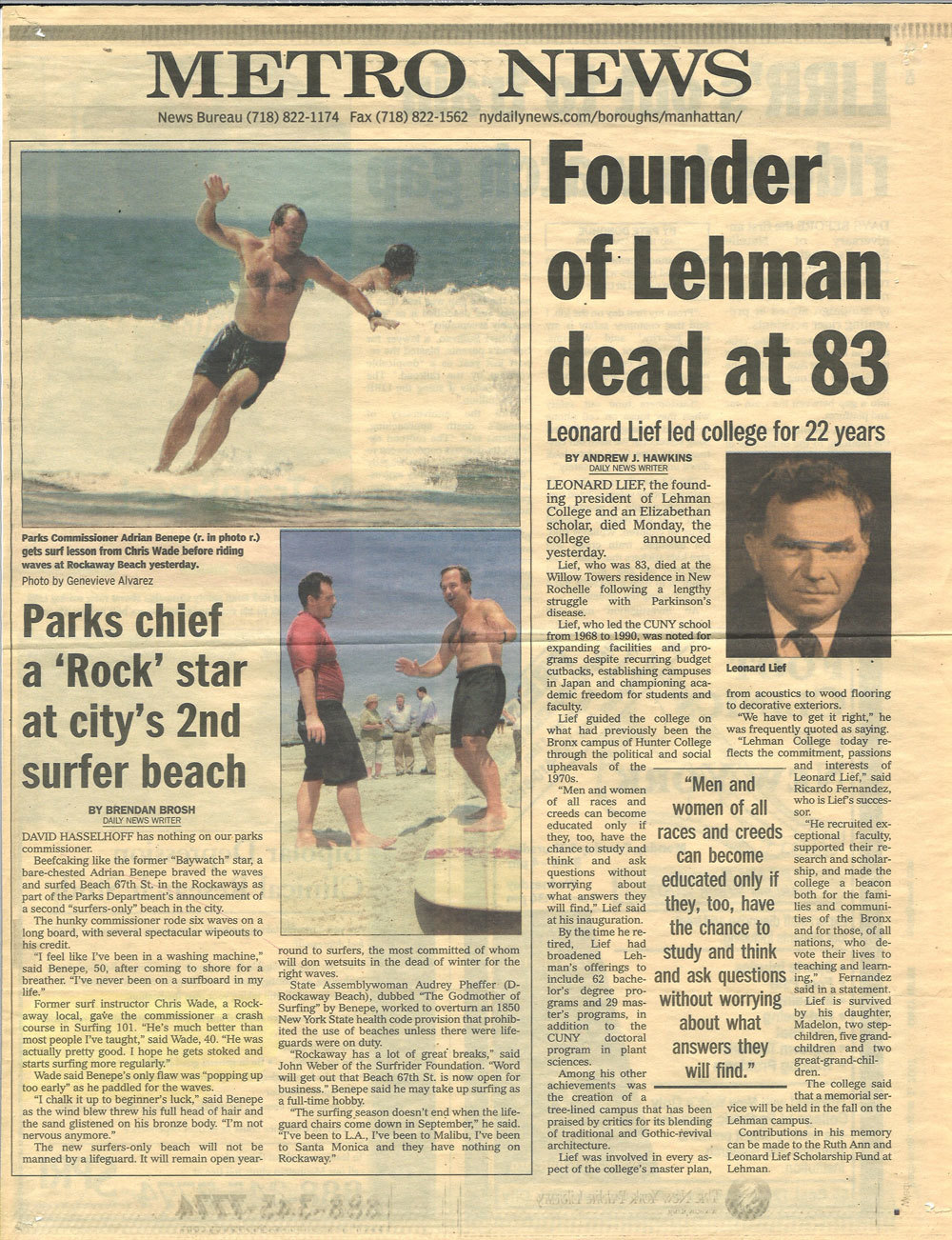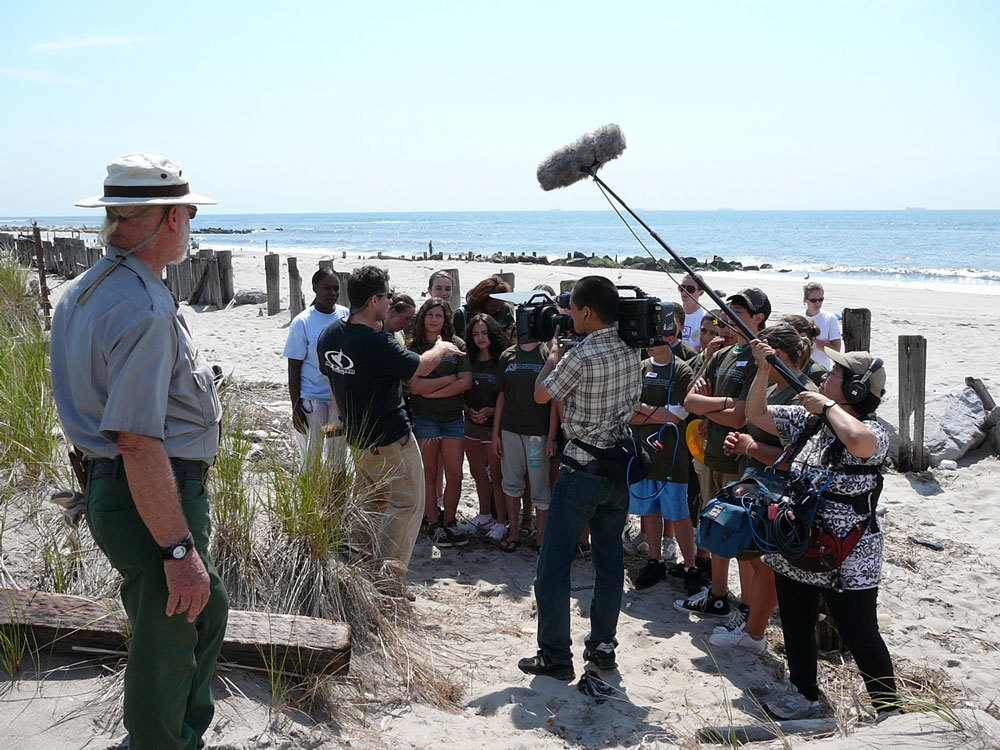
Q: Please give us a brief introduction about yourself. How has your unique experience as someone from the LGBTQ+ community framed your perspective as an activist and as part of the Surfrider network?
So the shorthand answer to the “who am I question” is that I'm a proud former Marine infantry officer, avid surfer, environmental activist, former public school teacher, current congressional staffer, a bisexual, transgender woman and more. Like Walt Whitman, “I am large, I contain multitudes.” But don't we all? I was listening to Irshad Maji, author of Don't Label Me, who reminds activists for change that “we are not labels” we are, all of us “plurals” that contain many identities, beliefs and affiliations. As a queer person, I'm honored that Surfrider Foundation wanted to highlight my story during PRIDE 2020 (you can't cancel the PRIDE INSIDE!). But as a queer person and as a representative of all my other traits, identities and affiliations, I want to thank my fellow SF activists for building such a strong, welcoming, and inclusive tribe.
In a country that is just beginning to take seriously its legacy and ongoing structural racism, I won't speak for others, and if there are those in or outside our chapters that see ways to improve Surfrider’s culture, I hope we will hear and support them. But I want to say that the unique, mission driven focus and direct action model of organizing, coupled with a rare and sincere commitment to non-partisan political participation has, I believe, made Surfrider a second home for me. It is the most welcoming, affirming and supportive place I know, not just for me, but in my limited view and in my perception of the common experience, of those who I have organized with.
What makes Surfrider so special, is that it is organized around such a clear and existentially important mission, “to protect the world's oceans, waves and beaches for all people,” that it has always been a place that has been open to everyone's plural identities.
Q: What is your current job or role in your local chapter?
Here I have to out myself… I am still listed and get the emails as “Core Volunteer” at the West LA-Malibu Chapter. Although I did do a fair bit of work with the chapter in 2016-18 to win passage of a polystyrene ban in Culver City, California, the truth is that I haven't been as active since coming down to Orange County and dedicating my time as the Volunteer Director for the Cisneros Campaign and now as the Veterans Liaison and Field Representative in the Cisneros District Office.
I think this profile is the universe telling me to stop shirking my Surfrider responsibilities and get active with the Huntington & Seal Beach Chapter because that's where I surf and closest to where I live now.

Stephanie on a Maldives Boat Trip in July of 2016, just six months before starting her medical transition
Q: Why and when did you get involved with the Surfrider Foundation?
Like everyone who volunteers in our chapters, I was driven by the mission to save our planet and there seemed no better place to start than an organization that can put you to work protecting the “world's ocean, waves and beaches for all people.” Surfrider is also really compelling because of its connection to surf culture, even our non-surfing members are attracted to the culture and its aesthetic. It's not an accident that I joined Surfrider in 2002, the same year I picked surfing back up after a 12 year hiatus. But like most people, I was looking for more than just a 'cool' way to be an environmentalist. I wanted to make friends and meet new people. That's an important part of the experience, and almost 20 years into being a Surfrider volunteer, many of my closest and dearest friends are people I met way, way back at the NYC-chapter and I can say I have met some great new people on the west coast too.
I always advise chapter leaders, and even organizers in other fields, that while you can't become a social club and must always focus first on the mission, you need to make sure that your volunteers are having fun and get to meet other fun loving people. My intuition is that the suffragists, SNCC and the folks at GLAAD knew how to keep it fun too. Striking that balance keeps your organization sharp and motivated.
Q: Do you have any experiences where the LGBTQ+ and environmental movements have intersected?
In my experience there is a great deal of overlapping concern, but the environmental and civil rights of LGBT people movements are hard to see in directly intersectional terms. That said, I think if there is an area of intersectionality, it probably has to do with the culture and etiquette of surfing. Everyone who surfs knows that there continues to be an element, and at some breaks a dominant theme, of sexism and white, male, toxic masculinity. I think a lot of 'dudes,' even some 'dudes-of-color' get sucked into it and think it's just a mark of skill and honor they call 'localism.' It's the presense of more women, black and brown, as well as gender and sexually non-conforming people, who, little by little, make the line-ups more friendly and welcoming. Even when I had passing privileges as a pretty buff, 200lb white dude with tattoos, I was always happy when a woman or any other minority paddled out. It makes the lineup a friendlier and happier place.

NYC Parks Commissioner Adriane Benepe (Top and Bottom, no shirt) learning to surf from Stephanie (then Chris, in red rash guard) at the opening of Beach 80th Street in Rockaway as a designated surf beach.
Q: What are some local issues that are affecting your ocean, waves and beaches?
The Surfrider Foundation is so powerful and well organized in SoCal that it's awe inspiring, but the problems and forces arrayed against us often feel just as powerful. We passed Prop 67 to ban plastic shopping bags statewide, but now DART and the supermarkets are using the pandemic to bring them back. That, along with off-shore drilling—which helped give birth to the environmental movement—are areas that we will have to return to.
The Huntington Beach / Seal Beach Chapter is also working intensely on responsible responses to sea level rise that is becoming an existential threat to coastal communities. But I think the issue that is of greatest concern to those of us who live in Southern California is ultimately the safe removal of nuclear waste from the decommissioned San Onofre Nuclear Plant. In the early 2000s, Surfrider activists put in hundreds of thousands of person hours, leading a regional coalition that finally defeated toll road construction and saved Trestles. But the San Onofre plant is not only leaking small amounts of radiation into Trestles now, but if we leave the spent nuclear waste there, as public officials plan to, it will inevitably cause an accident that will poison not only the most famous break in California, it will effect and threaten the lives of millions of people. So that's where I want to throw my environmental energy. Save Trestles, save SoCal, remove the waste!
-(1)-3342-1592946108.jpg)
NYC Chapter activists on unofficial Chapter Surfari to RI. Pictured L to R Chapter Activists Lauren & Adam West, Steph Wade, Dr. Abo & Dave Abo. Three of the six are now full time activists.
Q: What Surfrider projects have you worked on?
Most recently I helped in the coalition that brought a polystyrene plastics ban to Culver City, where I was living in 2016 and 2017. I have to give a BIG shout out to West LA/Malibu Chapter Chair Tina Segura, Chapter Coordinator Graham Hamilton, and Southbay Chapter leader Craig Cadwallader for their great and consistent leadership on that initiative. I've also helped with most of the core programs, like Rise Above Plastics. But the local campaigns are the ones that stand out in my mind, especially the Rockaway Beach Access Campaign (we legalized and then expanded NYC surfing access by 100% in just about 5 years, and I got to teach NYC Parks Commissioner Adriane Benepe how to surf!), a dune restoration project in Rockaway that was covered by the Bill Moyers narrated feature documentary Treasures of the Harbor, the Bigger, Better Bottle Bill campaign (working with NYPRIG & a broader coalition we revamped New York State's signature recycling program) and the NO LNG Campaign.
Q: What has been the highlight of your Surfrider experience (i.e., campaign, program, victory)?
The NO LNG Program is probably the biggest and most important campaign I've ever worked on. It's not my accomplishment; it’s such a big, big effort that includes other groups, and hundreds if not thousands of NYC-Chapter volunteers who have led protests, done interviews and participated in public hearings. It was brought to our NYC Chapter's attention by chapter member Gene McLoin and really championed by a number of chapter leaders including Kat Began, Katherine Moriwaki and Steff Zelinger. We have won numerous victories, but that campaign remains ongoing… it's like a giant game of whack-a-mole because the moneyed energy interests just keep coming back with new plans to try to wreck one of the most vitally sensitive reefs in the Northeastern Seaboard. Some may find that frustrating, and on a certain level it is; but I see a glass half full. It demonstrates the power of grassroots organizing.
When I looked at the member rolls in 2009 and realized that in three years of campaigning we had grown our paying membership by 32% to 800 members, at least 30% of whom had contributed in events, when the Governors of both New York and New Jersey both vetoed LNG plans that their administration had publicly endorsed for years, when we were able to get coverage on TV, the radio, and the New York Times, I knew we had accomplished something special!
But the best part of all that has been the great, eco-conscious friends I made in those campaigns. In 2010, a couple of us organized an unofficial chapter camping trip to Rhode Island. It wasn't a chapter function, but we put it out to everyone and got a core group of about 15 to go. We got great surf and a few good meals, but mostly we had the camaraderie of working to make a difference on the most vital environmental issues of our time. When I look back at the pictures from that trip, I see many of us are now full time activists. It's been a great journey so far and I am still excited to see where Surfrider and the people I've met in Surfrider will take me!

Stephanie Wade (center, black T-shirt) briefing volunteers for a 2007 Beach Grass Planting Project in Jacob Reese National Recreation Area as a Park Ranger looks on. The event and an interview with Steph were recorded in the feature length documentary “Treasures in the Harbor”
Q: Anything else you'd like to share with our network about your journey?
If I could close with one thing more, it is to thank my mentors on the staff at Surfrider. I have known and loved Chad since the 1990s and Ed Mazzarella offered me a job once that I'm still mad I didn't take! But the person that has inspired me most is John Weber. If you don't know him, John is Surfrider Foundation's Mid-Atlantic Regional Manager. None of the things we did in the early 2000s would have been possible without John's support and leadership. He is a great guy, a solid surfer and a very, very committed activist. I don't get to surf with John much these days (he frequently complains about the long line of NYC chapter chairs he's mentored only to have them move out to the west coast!), but I can't thank him enough for everything he taught me about organizing and leading people.
In my current job as a Congressional Field Representative, I still frequently find myself thinking back to big and small things John taught me, like how to write a press release or turn an angry volunteer into a productive one. So I guess the last word is for my fellow Surfrider volunteers to understand and support the very lean, very professional staff that works at Surfrider. Volunteers are where the rubber meets the road. We do the work. But without the key leadership and infrastructure provided by that small, elite staff, we would be accomplishing very little.